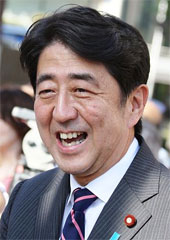Japan Votes to Go Back to the Future
Who is more fundamentally opposed to real reforms, Japanese politicians, Japanese voters — or both?
December 18, 2012

It may be déjà vu all over again as Shinzo Abe resumes the power he relinquished in 2007, after only a year in office. In last weekend’s elections, Japanese voters made clear their thirst for a return to Japan’s glory days of steady economic growth and strong global presence.
What they could be getting under Abe’s Liberal Democratic Party (LDP) instead may be a continuation of the vicious cycle of backroom politicking, excessive dependence on public spending and social conservatism.
That is the same toxic mix that has kept the country from getting out of its two decade-long doldrums.
The single biggest challenge for the new government is whether Abe will be a strong enough leader to put an end to the curse of Japan’s revolving door for prime ministers. Japan has had seven prime ministers in as many years.
The hallmark of Abe’s campaign rhetoric had been the call for strong leadership, especially in foreign affairs. Abe rallied for Japan not to shy away from relying on a strong national identity in the international arena.
Abe calls for Japan to defy China and South Korea over several disputed islets in the East China Sea resonated particularly strongly among those who were enamored with the rhetoric of former Tokyo governor Shintaro Ishihara. Ishihara, a co-leader of the Japan Restoration Party in the December 16 elections, is the author of the 1989 blockbuster, The Japan That Can Say No.
Obviously, the appeal of Abe’s nationalist rallying cry actually increased following North Korea’s successful launch of a satellite only days before the election.
However, given that the LDP will be joining forces with the Buddhist-backed Komei Party to secure its two-thirds majority in the powerful lower house of the Diet, Abe’s nationalistic rhetoric is expected to be toned down as prime minister. Komei has shied away from supporting the LDP’s call for an immediate upgrade of Japan’s self-defense force to a full-fledged military.
Instead, the Komei Party has stated that while it supports the LDP’s aspirations for a stronger military in the longer-term, it remains committed to Japan’s current constitution that focuses on using military power for domestic protection.
The need for Japan to work closely with China and South Korea in the face of a common threat emanating from North Korea has become more clear-cut.
Looking back to Japan’s economic heyday
Abe’s bigger challenge will be the issue that has stymied all of the prime ministers over the past several years — namely, the economy. It has been stuck in a rut for the past two decades.
Instead of looking forward, the LDP’s platform has been focused on looking back to the country’s economic heyday. That is perhaps understandable as far as feel-good campaign rhetoric goes.
Nostalgia, though, is not an effective policy platform. Any attempt to try to replicate what succeeded then, including increasing public spending and easing monetary policy even further to boost consumption and mortgage lending, would at best provide short-term relief.
And yes, it would weaken the Japanese yen somewhat, giving the country’s exporters a boost. Yet, those are precisely the kinds of LDP policies that ultimately led to Japan hitting an economic wall in the first place.
Despite its electoral success, the party has yet to outline a vision for policies that would lead to longer-term structural reforms, including encouraging entrepreneurship and raising tax revenues.
The first litmus test of the strength of the Abe government may well be its vision for Japan’s energy future. The nation continues to struggle with the aftermath of the March 2011 earthquake, and the post-Fukushima nuclear fallout in particular.
For its part, the LDP has pushed for a resumption of Japan’s dependence on nuclear power, which until March 2011 had been pivotal for the success of Japanese industry. The LDP’s push to get all 50 of the country’s reactors back online has been welcomed by the business community at large.
But given deep-seated public concern about the government’s response at the time of the disaster and its subsequent efforts to deal with the effects of radiation across the country, simply asserting that what was good in the past is good for the future will unlikely be enough to appease the public.
Given the size of the public protests in July when two of the reactors were restarted, moves to reopen the remaining 48 could well destabilize the LDP leadership, regardless of the size of its majority in parliament.
Moreover, the open secret is that Abe may not have the stomach to deal with all the looming political troubles. While considered a political blue blood due to the fact that he stems from a family of LDP leaders (his maternal grandfather, Nobusuke Kishi, was prime minister from 1957 to 1960), he is neither a political heavyweight nor a full-blooded politician.
In his previous turn in the prime minister post, Abe announced his resignation after less than a year in office, in September 2007, because of poor health. It was widely believed that his health problems were a result of the stress of the office.
Not only are the political waters no less choppy now than they were five years ago. The stakes are also considerably higher as Japan faces ever bigger pressures, both at home and overseas. If he is to succeed this time around, Abe will need to reach deep and find the political resolve to look beyond the past to ensure Japan’s future success.
If that does not happen, another prime ministership will have been wasted. But this game of musical chairs is something which Japan can no longer afford.
The electorate, too, is running out of hope. This time around, it could yet again convince itself that a new (although very old) broom can clean house. What is so unclear, however, is who is more fundamentally opposed to real reforms, Japanese politicians, Japanese voters — or both.
Takeaways
Abe may not have the stomach to deal with all the looming political troubles.
The first litmus test of the strength of the Abe government may well be its vision for Japan's energy future.
Instead of looking forward, the LDP's platform has been focused on looking back to the country's economic heyday.

